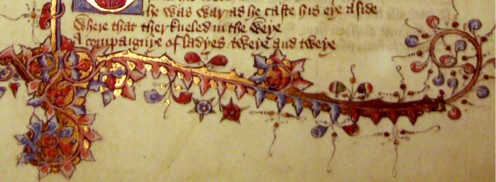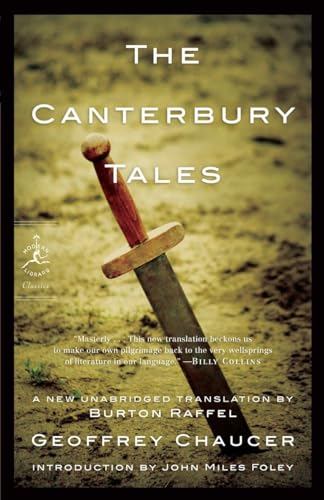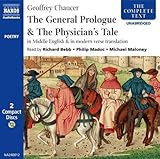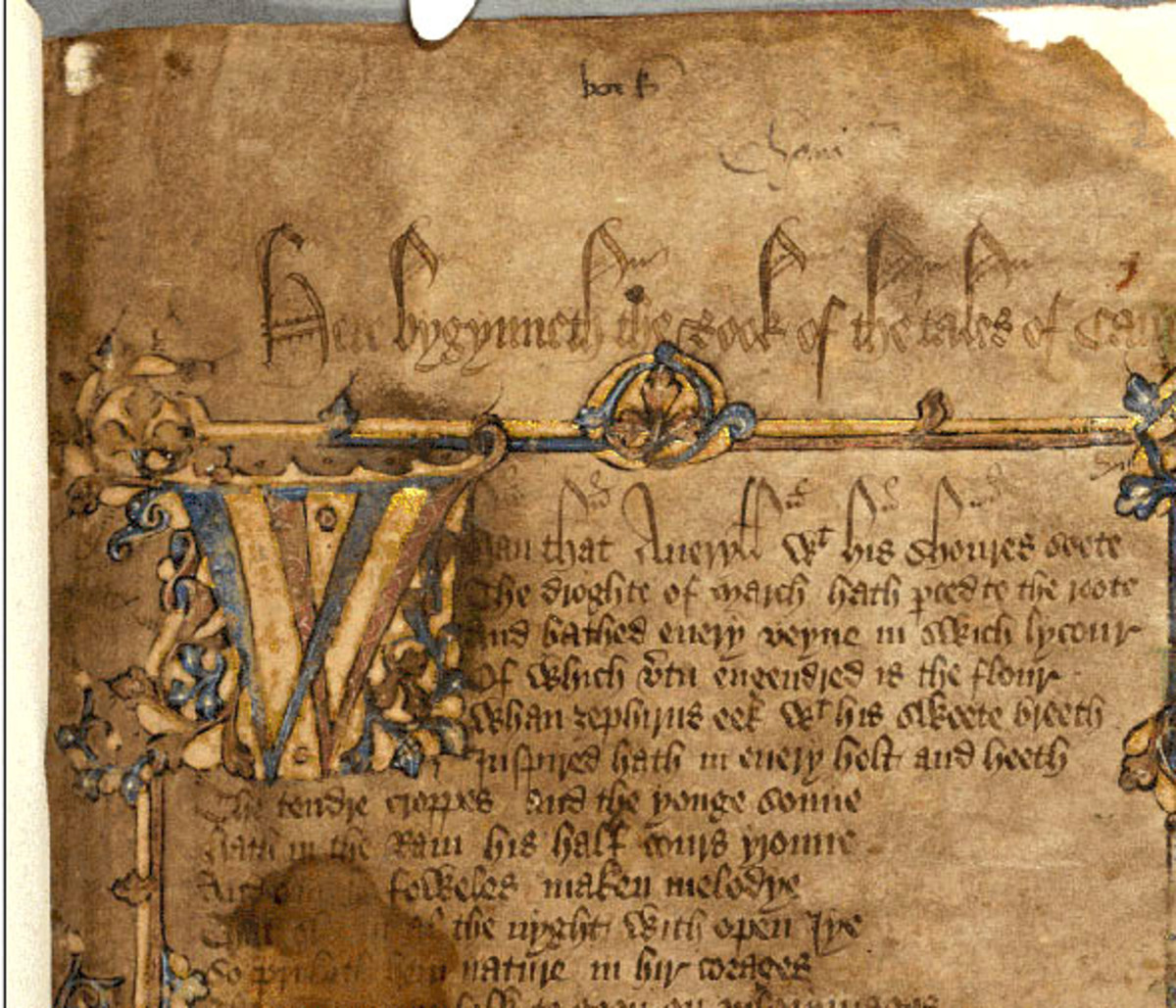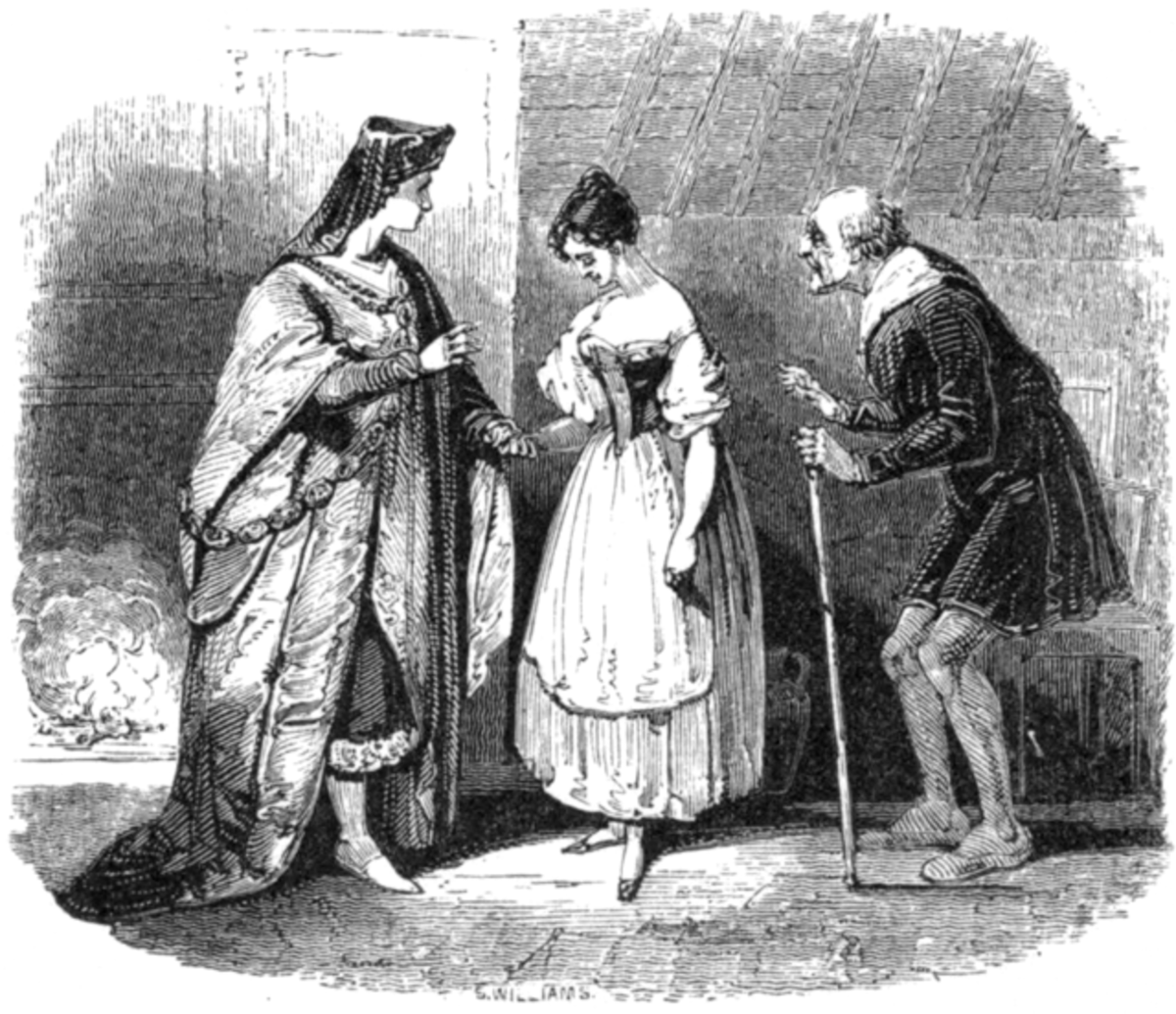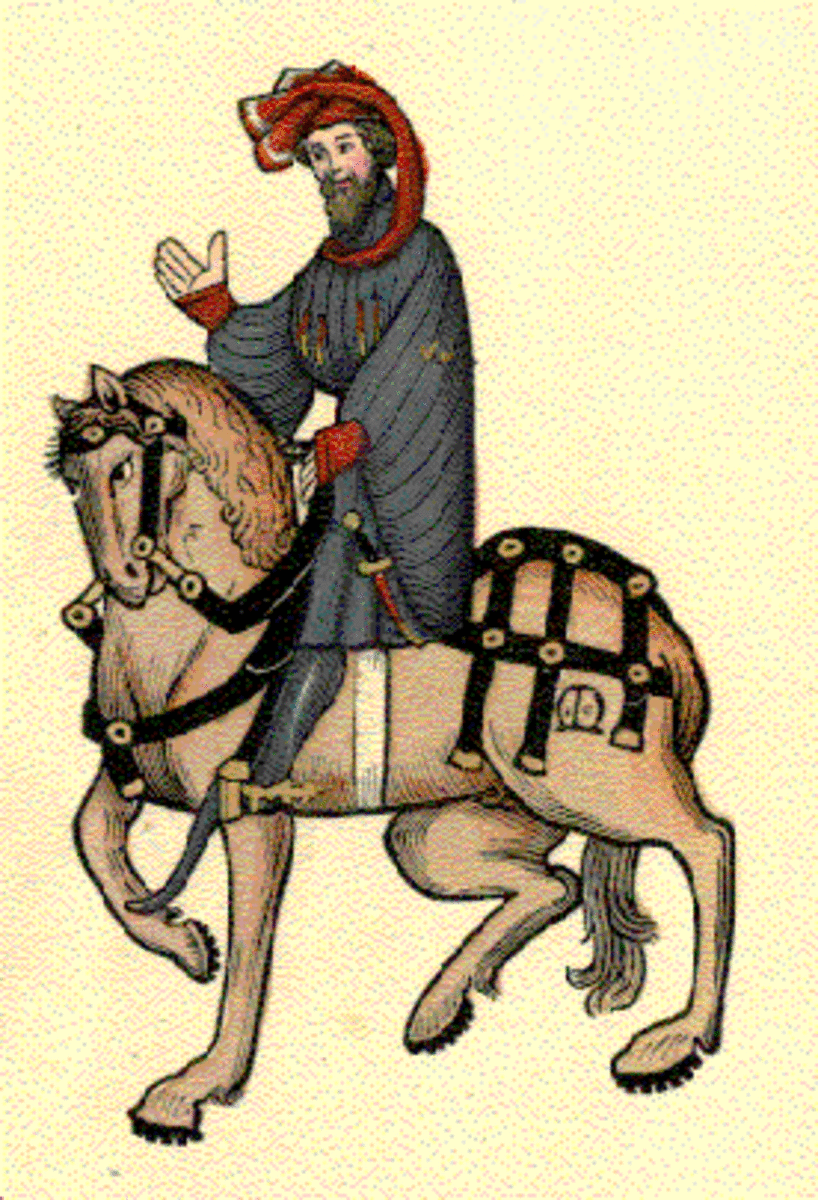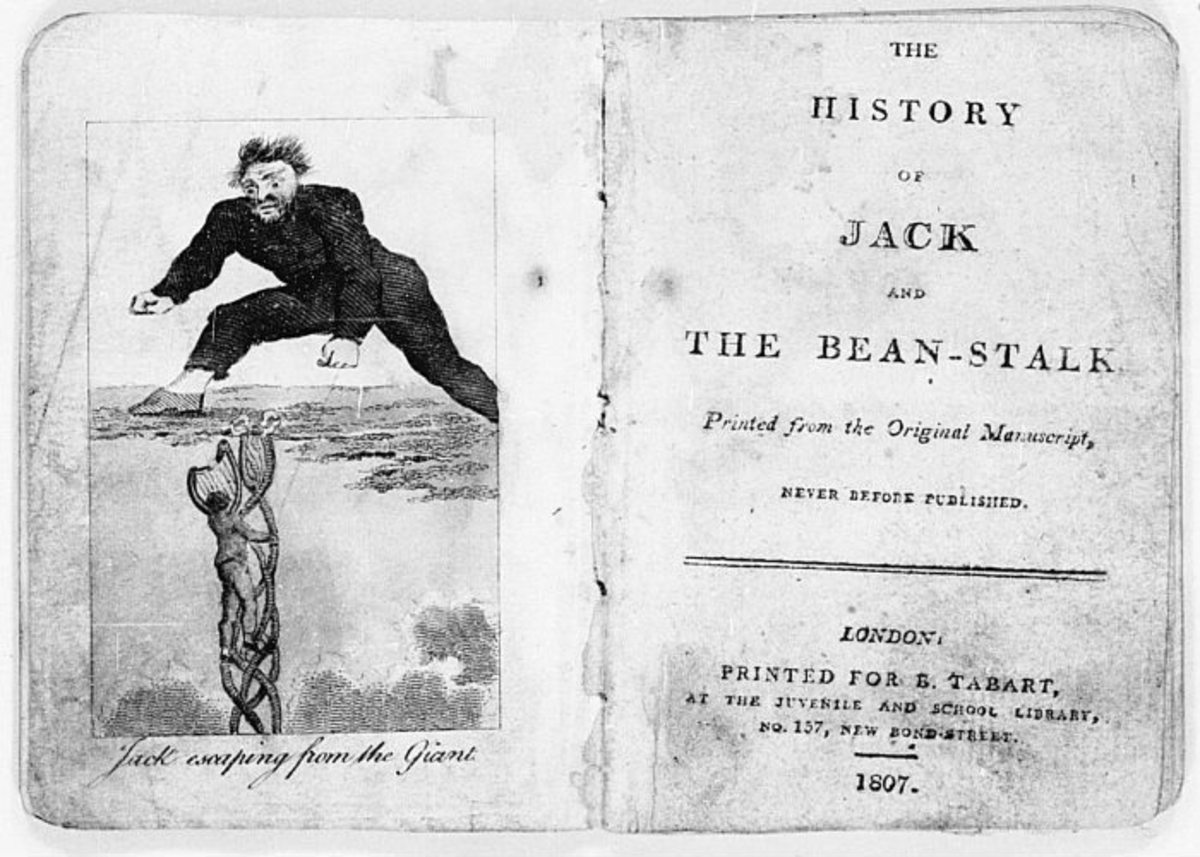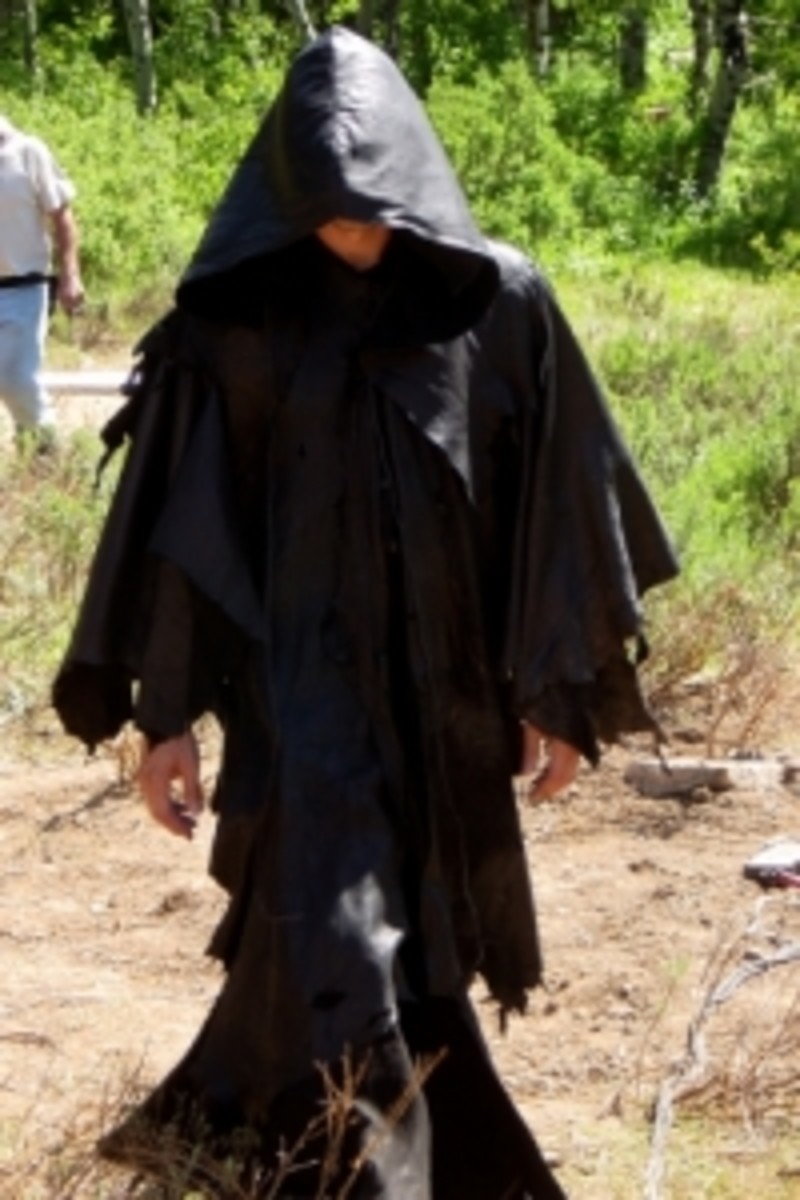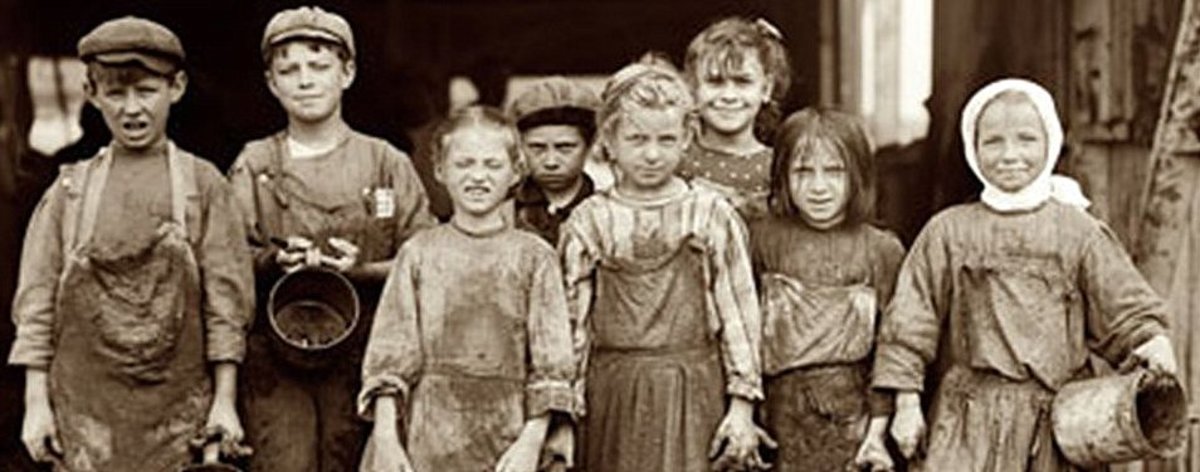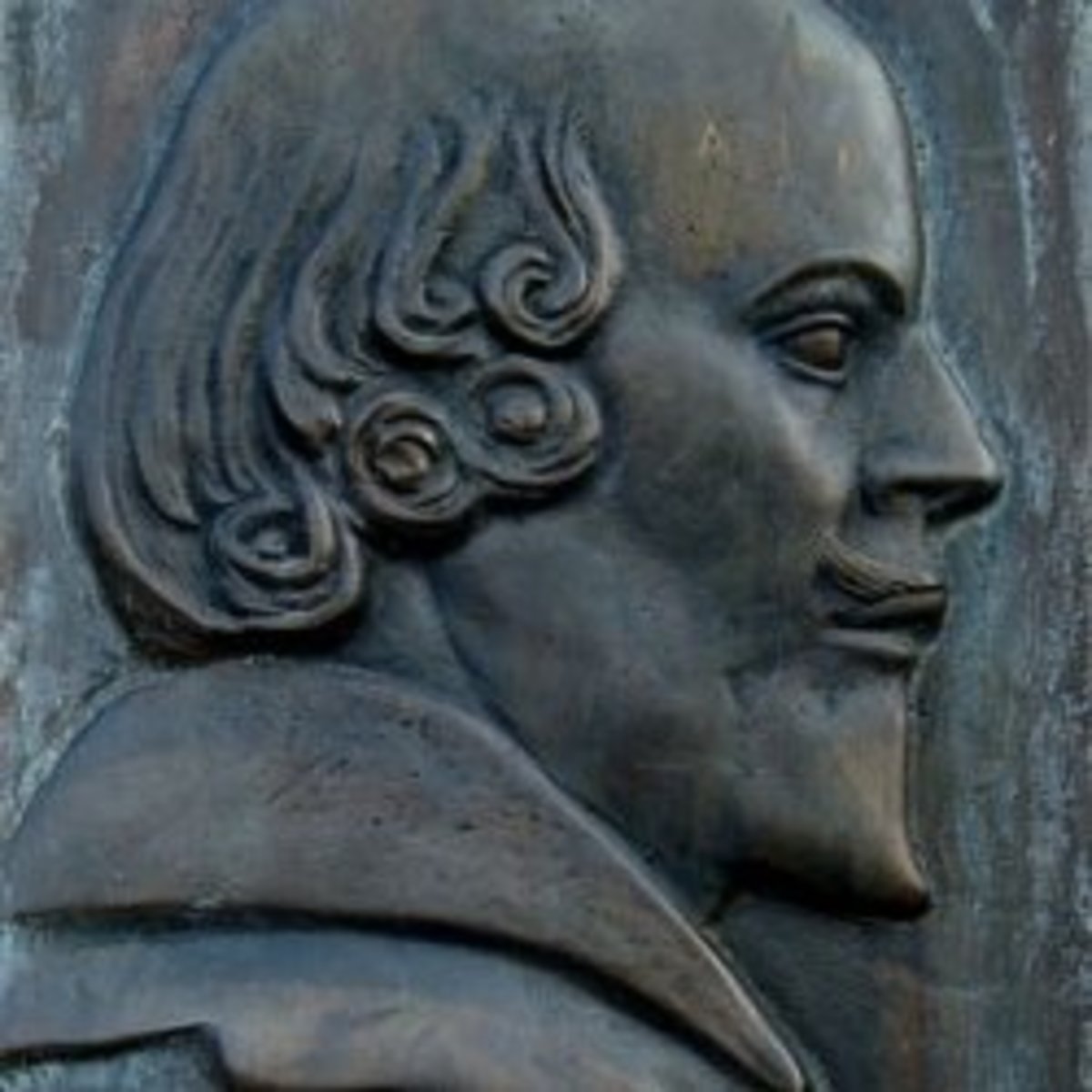- HubPages»
- Books, Literature, and Writing»
- Literature»
- English Literature
Chaucer, The Physician’s Tale and the Bible
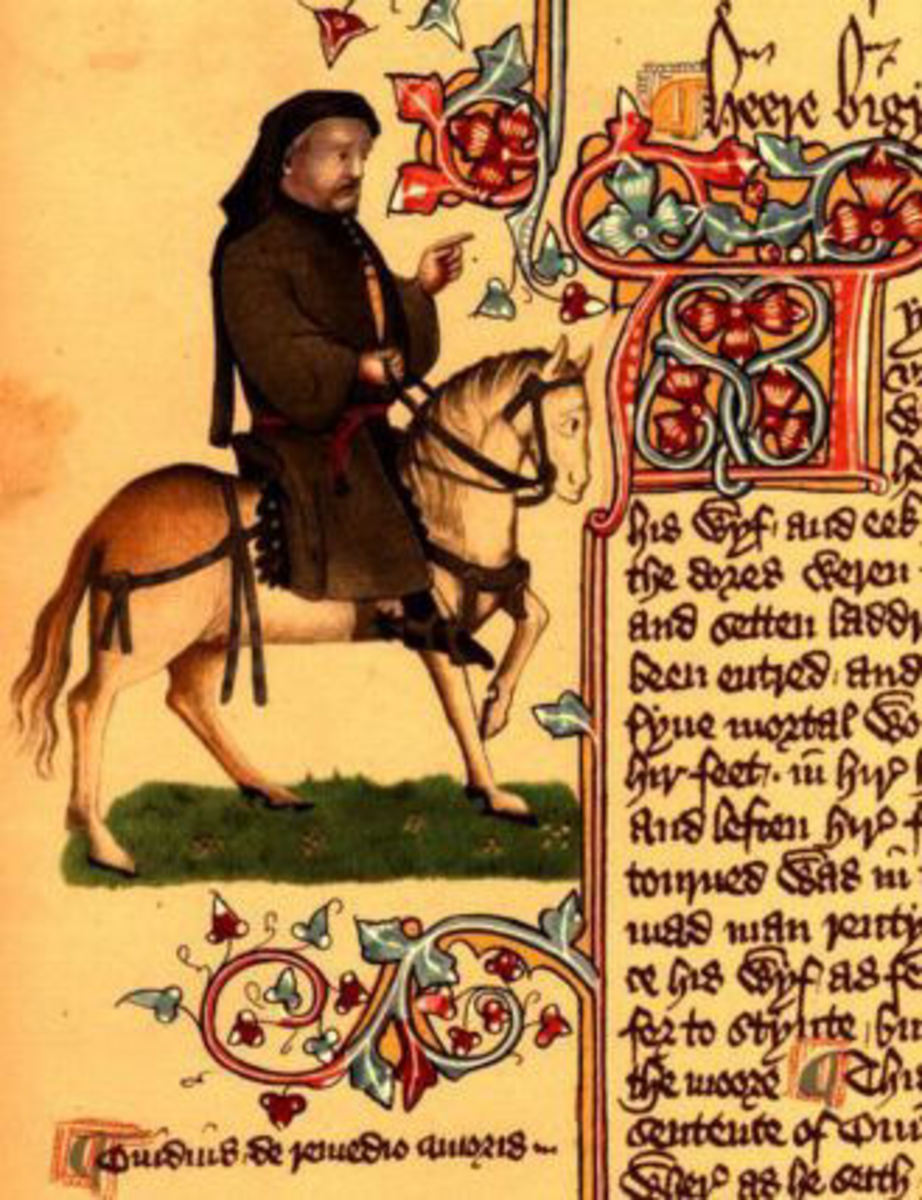
Chaucer's 'Physician’s Tale'
'The Physician’s Tale' is one of Geoffrey Chaucer's 14th century 'Canterbury Tales'.
Geoffrey Chaucer was born in about 1343 and died in the year 1400. He was still working on his most famous work ~ The Canterbury Tales ~ at the end of his life. Indeed, though the bulk of the work was completed, this project remained unfinished at Chaucer's death.
'The Canterbury Tales' was a collection of stories, which purported to be told by different members of a group of pilgrims, en route to Canterbury ~ to the historic tomb of Thomas a Becket.
This one ~ 'The Physician’s Tale' ~ concerns a father and daughter, who are brought into a critical situation, by an immoral judge.
Chaucer based this work on an earlier, similar story, which can be found in the 'the Histories of Titus Livius' and the 'Roman de la Rose'. It also contains elements of other stories, including that of Jephtha and his daughter, from the Old Testament.
This story is not the only case, where Chaucer was inspired by the works of others.
However, each time, he brings his own gifts to the original items.
'The Physician's Tale' is unusual, in that it does not have a prologue, as most of the other tales do.
This is study of one of Chaucer's works and one of the Bible's stories ~ an article where History, Theology and Literature meet.
Geoffrey Chaucer
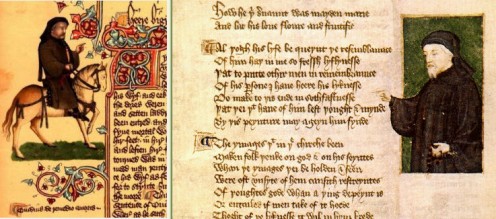
Copyright
Please note that photographs and quotes, which are not my own, have been credited accordingly.
My own work is covered by Copyright law.
Copyright Tricia Mason. All Rights Reserved.
Inspiration
I decided to write this article, after reading an item by 'Hubber' Ademaree: 'Rape in Chaucer'. I quote Ademaree here and later in this hub.
Ademaree looks critically at Chaucer's treatment of the virgin daughter, the father's treatment of the virgin daughter and their society's treatment of the virgin daughter.
Of Chaucer, she writes: 'Chaucer’s treatment of Virginia is callous at best.'
Of the father, she writes: 'her father value[s] his daughter’s chastity over her life'
Of the society, she writes: 'They were not so willing to rescue Virginia ..'
Fair Maid Who Delighted Nature

Chaucer's Work
What Happens in the Story?
Once upon a time, in ancient Rome, there lived a prosperous, noble, popular and honourable knight, named Virginius. He married and his wife presented him with his only child: a very beautiful, good, kind, loyal, sensible, pure, chaste, wise, well-mannered, well-spoken, modest and, in every way, delightful daughter. She did not drink alcohol and she kept away from revelry and from any event that might descend into bad behaviour.
Indeed, she became famous for her goodness and her beauty.
One day, when the girl was fourteen, she attended the temple with her mother. On her way there, she was noticed by the local Governor, a judge named Appius, who was instantly attracted to her, and who vowed to take her for himself. He plotted to have her. He knew that she was a good girl, who could not be bribed to sleep with him and who wha the support of many loving friends ~ so he had to use cunning.
The judge found a sly ruffian, named Claudius, who would help him, and keep his plan a secret, for a substantial reward ~ and on pain of death.
This is how the plan played out: Claudius took a petition to the court and asked Appius to deal with it. His petition claimed that the Knight, Virginius, had stolen a female slave from him, when she was very young, and untruthfully claimed her as his daughter. Virginius was not even allowed to speak. The Judge decreed that the girl had to be given back to Claudius. Virginius knew that his daughter was to be given to the judge, to share his bed ~ to live in unholy sin.
He went home to his daughter and told her that there were only two choices ~ shame or death. He said that she was his joy and did not deserve to die, but that her death was the only answer. He would kill her out of love, not hatred; he would behead her as an act of mercy. He wished that Appius had never set eyes upon her and had never felt need or desire to cast this false judgement.
The girl began to cry and put her arms around her father's neck, as she had often done before, and said: 'Good father, must I die? Is there no mercy for me; no alternative?' ~ 'No, I am certain that there is none, my dear daughter', replied her father.
She asked for a little time, in order to take things in ~ as Jephthah must have given his daughter, who was also guiltless. Then she fainted.
When she came around, she said: “Blessed be God, I shall die a maiden (virgin). Give me my death before I have shame (dishonor). Do your will with your child, in God's name!” She prayed that her father would strike off her head with his sword, and then she fainted again.
Virginius then sliced of his daughter's head and took it to show the Judge, Appius. This judge then ordered that Virginius should be hanged for murder, but the local people took pity on him and saved him, because they guessed that the lecherous Appius was behind the tragedy ~ and they had the latter cast into prison, where he killed himself.
Humble, Pure, Temperate and Patient

A Moral Tale
Some of the Canterbury Tales are classed as 'moral tales' ~ and this seems to be one of them. However, it is difficult to actually understand the moral, here.
This story ends:'Therfore I rede yow this conseil take, Forsaketh synne, er synne yow forsake' Ie forsake all sin before sin causes you to be foraken' ~Ie; 'forsake all sin before sin causes you to be foraken', or words to that effect.
The moral of the story appears to be that all sin will be paid for ~ somehow.
But it is a strange and cruel story, without any light relief ~ and the moral seems not to fit logically with the story.
Why is there no suggestion of Virginius arguing his case; asking the townspeople for their support; running away with his family? Were these really so impossible?
Was Chaucer trying to bring certain things home to his audience, about the rights and treatment of females, perhaps?
What is the sin that Virginia is paying for?
Or is it Virginius, who is supposed to be paying the price?
I shall look at this matter, again, later.
The mother isnm't even mentioned and gets no chance to have her say or even kiss her daughter goodbye.
The Corrupt, Lecherous Judge Wanted The Girl
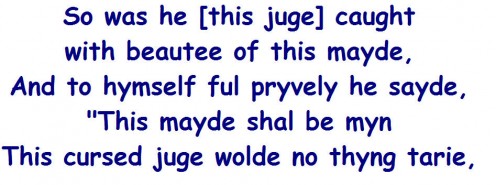
Quotes From Ademaree
In Ademaree's article, about 'The Physician’s Tale', she makes some very thought-provoking points.
Here are some quotes from her work:
~ "To murder his own daughter is surely a sin greater than that of having unwedded sex .."
~ 'Virginia may as well just be called “The Virgin" ... We only know ... that she remains intact. This is considered a virtue, as though by holding onto her hymen she is somehow deified. In the end she is still a virgin .... Yet with Virginia presented as the epitome of woman, it begs the question of what the woman’s role is in the world if not for the making and incubating of babies. ...'
The Sly Cherl Pretended that The Virgin Girl Was A Stolen Slave. The Lecherous Judge took her as his Ward.


"To murder his own daughter is surely a sin greater than that of having unwedded sex .." [Ademaree]
Is ~ or was ~ it considered true, that "To murder his own daughter [was] a sin greater than that of having unwedded sex .."?
With the Bible as the prime example, for Christian societies to follow, I do wonder.
After all, this is what we find in Deuteronomy 22:13-21 (New International Version - UK)
'If a man takes a wife and, after lying with her ... gives her a bad name, saying, I married this woman, but when I approached her, I did not find proof of her virginity ... then the girl's father and mother shall bring proof that she was a virgin to the town elders at the gate. ....
'If, however, the charge is true and no proof of the girl's virginity can be found, she shall be brought to the door of her father's house and there the men of her town shall stone her to death. She has done a disgraceful thing in Israel by being promiscuous while still in her father's house. You must purge the evil from among you.'
Thus, a father, who knows that his daughter is not, or will not be, a virgin, at marriage, is obligated to 'purge her evil' from their society, by having her killed. Thus, according to Deuteronomy, 'his own soul' is safer this way than if he allowed his daughter to be violated and live.
So, it is not surprising, as Ademaree notes, that 'In the tale by the physician, Virginia is not even given the option of being shamed.'
Shame or Death. Her Father Says That She Must Die
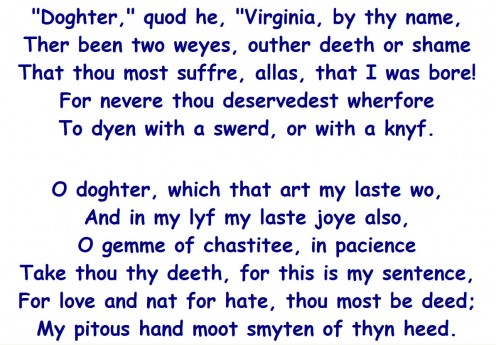
'Virginia may as well just be called “The Virgin”' [Ademaree]
'Virginia may as well just be called “The Virgin”.'
And, in effect, she is.
Virginia is her name; Virginius is her father's name.
'We only know ... that she remains intact. This is considered a virtue, as though by holding onto her hymen she is somehow deified. In the end she is still a virgin .... Yet with Virginia presented as the epitome of woman, it begs the question of what the woman’s role is in the world if not for the making and incubating of babies. ...'
Absolutely!
Like the Virgin Mary, it seems.
Mary was almost deified; like a goddess. Mary was ever Virgin ~ in spite of giving birth. She was both mother and virgin ~ the epitome of womanhood and the opposite of the fallen 'Eve'.
No ordinary female can live up to this. Women have to choose ~ virginity or motherhood; purity or shame.
For Virginia, ot was death or shame ~ and it wasn't even she, who made the choice.
Tears as she Hugs her Father and Begs for Mercy
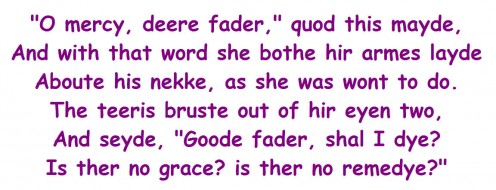
Chaucer And The Church
Chaucer seems to have used his poetry, on other occasions, to subtly criticise Christian beliefs and society. He may be doing the same, here.
Does Chaucer think that it is right and proper for a man to ~ supposedly mercifully ~ kill his daughter, in order that she will not be shamed? Indeed, in order that she will not be subjected to the animal desires of an older, lecherous man, whom she barely knows??
Chaucer has his victim, the pure Virginia, relate her own circumstances to those of Jephthah's daughter, in the Bible.
Blessed To Die Am Unshamed Virgin

'Jeptha's Rash Vow'
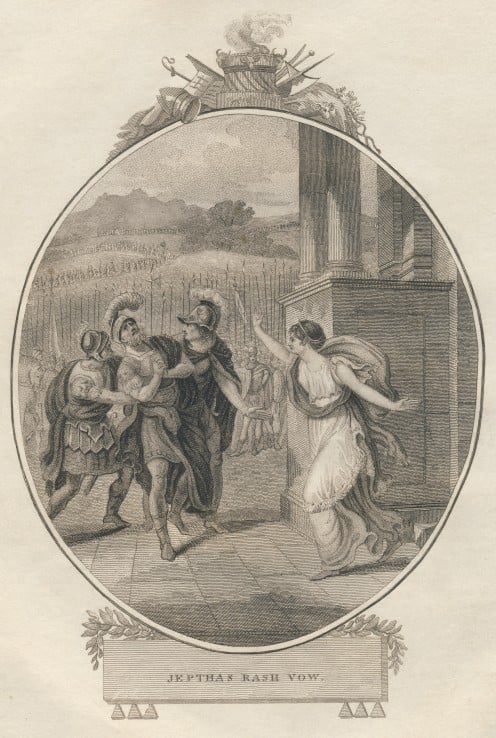
The Story of Jephthah and His Daughter
Here it is:
Judges 11: 29-39
Jephthah the Gileadite was a mighty warrior, and when the Spirit of the Lord came upon him, he was able to advance against the Ammonites.
He prayed to God, vowing that: "If you deliver the Ammonites into my hands, whatever comes out of the door of my house to meet me, when I return in triumph from the Ammonites, will be the LORD's, and I will sacrifice it as a burnt offering".
Jephthah then fought the Ammonites, and the Lord delivered them into his hands, so Ammon was subdued by israel.
Jephthah returned home in triumph and who should come out to meet him, but his daughter, dancing to the sound of tambourines! She was his only child.
When Jephthah saw her, he tore his clothes and he cried, "Oh! My daughter! You have made me miserable and wretched, because I have made a vow to the LORD that I cannot break".
"My father", she replied, "you have given your word to the LORD. Do to me just as you promised, now that the LORD has avenged you of your enemies, the Ammonites ~ but grant me this one request", she said. "Give me two months to roam the hills and weep with my friends, because I will never marry".
"You may go", he said. And he let her go for two months. She and the girls went into the hills and wept because she would never marry. After the two months, she returned to her father and he did to her as he had vowed.
She was a virgin.
[Based on a translation found at Biblegateway.com]
Off With Her Head - Her Father Takes it to the Judge

Jephtha's Return - Giovanni Antonio Pellegrini
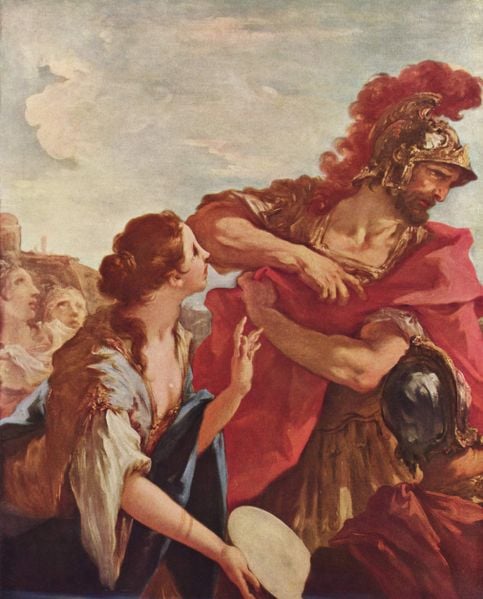
Christian References
Can we be sure that Chaucer even knew about Biblical stories, or had them in mind?
Was Chaucer thinking about the justice of Deuteronomy, or the perfection of the Virgin Mary?
We do know that Chaucer used his rather vulgar 'Miller's Tale', to mock members of the Church.
And, in the same story, he uses the traditional tale of the Biblical Flood for a practical joke.
Maybe we cannot be sure exactly what Chaucer is signifying, religion-wise, but we do know that he makes reference to the Bible story of Jephthah and his daughter, in 'The Physician's Tale'.
Chaucer / Royal Family Tree

Digression and Dating
Chaucer digresses from his story, for a number of lines, where he discusses the responsibility of governesses.
He notes that they have their job, because they are either very virtuous, or because they have reached an age, where they are too frail not to be virtuous, but know enough about misconduct, that they can keep a knowing eye on their charges, and can teach them virtue.
Wikipedia claims that these comments may relate to the time, when John of Gaunt's daughter eloped, while under the governance of Katherine Swynford. Katherine became John of Gaunt's wife, having been his mistress. She was also the sister of Chaucer's wife. John of Gaunt was the king's son.
Young Elizabeth went off to France, with the Earl of Pembroke, in 1386, so this 'tale' may date from shortly after this time.
Forsake Sin!

Paying the Price for Sin
This tale ends thus:
"Heere men may seen, how synne hath his merite.
Beth war, for no man woot whom God wol smyte
In no degree, ne in which manere wyse
The worm of conscience may agryse
Of wikked lyf, though it so pryvee be
That no man woot therof but God and he.
For be he lewed man, or ellis lered,
He noot how soone that he shal been afered.
Therfore I rede yow this conseil take,
Forsaketh synne, er synne yow forsake."
*
Gerard NeCastro [www.umm.maine.edu] has edited and translated a version of the tale and he transcribes the final part like this:
"Here all may see how sin has its deserts.
Beware, for no man knows a bit whom God will strike,
nor how the worm of conscience may tremble at a wicked life,
though it be so privy that none knows of it but the sinner and God.
For whether one may be ignorant or learned,
he knows not how soon he shall be made afraid.
Therefore I counsel you, receive this warning:
forsake sin before sin will forsake you."

An Unusual Tale
We have noted that 'Physician’s Tale' is an unusual one, with no prologue and no entertaining comedy. Indeed, the story's supposed narrator points out that it is actually a true story.
As we have noted, it seems to be a relatively early piece, which may date from about 1386 ~ that is fourteen years before Chaucer died.
Is it possible that Chaucer had heard this ancient story, re-written it in his own words, and then decided, a number of years later, that it would be adequate to add to his pilgrims' tales, without giving it too much thought or further attention? ~ This is possible.
Are there other possible explanations?
Is the audience / reader expected to discover more, in this tale, than is immediately obvious?

Physicians Tale
Is there more to discover about sin?
In this tale, is the audience / reader expected to discover more about 'sin', and whose sin is being paid for, than is immediately obvious?
*
There are three main parts to this tale:
1. The story itself.
2. The digression about governesses.
3. The advice about sin.
The story
The story, itself, describes a 'perfect' daughter, of a very popular man. Virginia's virtues are extolled. Surely there can be no sin in her life. She is innocent and blameless.
The digression
The digression does refer to sin and virtue:
As we have noted, Chaucer mentions that young Lords' daughters are provided with governesses, who are either pure and virtuous, or who have matured and left their less virtuous past behind ~ but they know 'the old dance' ~ love's tricks, so they can keep a wary eye on the girls.
Then he goes on to say that Virginia did not have or need a governess.
Since she visits the Temple with her mother, it would seem that it may have been she, who brought her daughter up, so good and virtuous.
As well as governesses, Chaucer also mentions parents:
"Ye fadres and ye moodres, eek also,
Though ye han children, be it oon or two,
Youre is the charge of al hir surveiaunce
Whil that they been under youre governaunce.
Beth war, if by ensample of youre lyvynge,
Or by you're necligence in chastisynge,
That they ne perisse; for I dar wel seye,
If that they doon ye shul it deere abeye;"
This roughly translates as:
'You fathers and mothers, too, are responsible for your children's upbringing, while they are in your charge. Beware that they don't perish, either because of your example, or because of your negligence in chastising them. I dare to say that you could pay dearly'.
The advice
Chaucer gives advice both in the digression and at the end.
Parents and governesses need to set a good example and chastise bad behaviour.
Sin always receives its just deserts.
No-one knows who, or when, God will strike and make the sinner afraid.
The worm of conscience may respond to a wicked life, even if no-one knows about the sin but the sinner and God.
Be warned forsake sin before sin forsakes you.
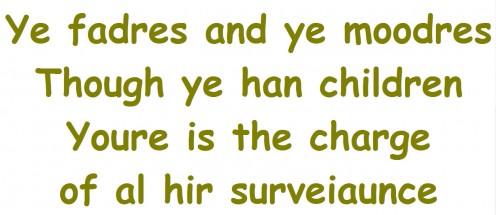
Conclusions Re Sin
According to 'The Physician's Tale', it seems that Children, who are not chastised and well brought up, may become sinful, partly because they may follow the bad example set by their parents, or carers.
Chaucer warns parents that, if they are not careful, then they could pay dearly and their children could perish, because sin always has to be paid for and God can strike sinners at any time ~ even if no-one knows about the sin, except for the sinner and God.
Virginia is struck down, so logic tells us that Chaucer intends his reader / audience to conclude that she is paying the price for sin.

For which Sin is Virginia's Life the Price?
Is it possible that the perfect and pure Virginia, had secretly sinned, and was now receiving her just desserts?
Is it possible that one or both of her parents had somehow set a bad example, and that she had been secretly corrupted?
Is it possible that, in spite of her own purity, there was lack of virtue in her ancestry, and she had to pay for those sins. Chaucer does mention that governesses might have been less that virtuous in the past ~ maybe her mother had been less that virtuous, also.
Virginia likens herself to Jephthah's daughter, whose grandmother, we are told, was a prostitute. Are we meant to seek a parallel for Virginia?
['Jephthah the Gileadite was a mighty warrior. His father was Gilead; his mother was a prostitute.' Judges 11:1 ~ New International Version - UK]
The reader does not know, for sure, and is left feeling somewhat bemused.
But we could look at it as presented ~ Is it possible that we really should see this as a merciful killing on the part of Virginius?
Virginia was young, sweet and innocent. Allowing her to be given to the sly Claudius, for the pleasure of the lecherous older man, Appius, may actually have been very cruel ~ a 'fate worse than death', indeed.
So perhaps it is the sin of Appius that is paid for by the death of Virginia.
She asked if there was a choice, other than death, and her father said that there wasn't. There was, of course ~ she could have gone to the corrupt lecher's bed. But would ~ indeed should ~ any loving father of an innocent virgin of fourteen allow this to happen?
She said that she felt blessed to die a virgin without dishonour.
As an aside, Jephthah's daughter seems to have been less happy about dying unwed and a virgin:
"Give me two months to .... weep with my friends, because I will never marry. ... She .... wept because she would never marry ... she was a virgin."
[Judges 11:37-39 ~ New International Version - UK]
The Physician - Introduced in the General Prologue

Alison and Virginia
It is interesting that Alison, the young woman in 'The Miller's Tale', has very questionable morals, and behaves accordingly, yet she receives no punishment, while the good and kind Virginia has to die ~ at her own father's hand!

Chaucer's 'Physician's Tale'
Chaucer - Another of My hubs
- Geoffrey Chaucer and the Canterbury Tales
Geoffrey Chaucer ~ fourteenth century English writer, poet, courtier, soldier and pilgrim / traveller; related to members of the royal court; possibly a spy! What do we actually know about him? What can be learned? How much can his 'Canterbury Tales'
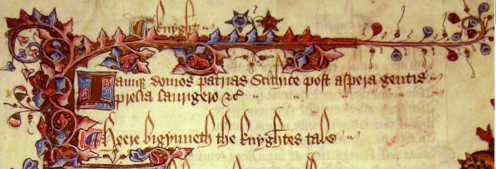
Chaucer Links + Bible Links
- Geoffrey Chaucer
- From "The Canterbury Tales" - The Physician's Tale (modern english and middle english)
From - Geoffrey Chaucer - The Canterbury Tales - 'Physicians Tale'
- The Physician's Tale - Wikipedia, the free encyclopedia
- Chaucer: The Physician's Tale - Study Notes
- Deuteronomy 22 NIVUK - If you see your brothers ox or sheep - Bible Gateway
- Judges 11 NIVUK - Jephthah the Gileadite was a mighty - Bible Gateway
